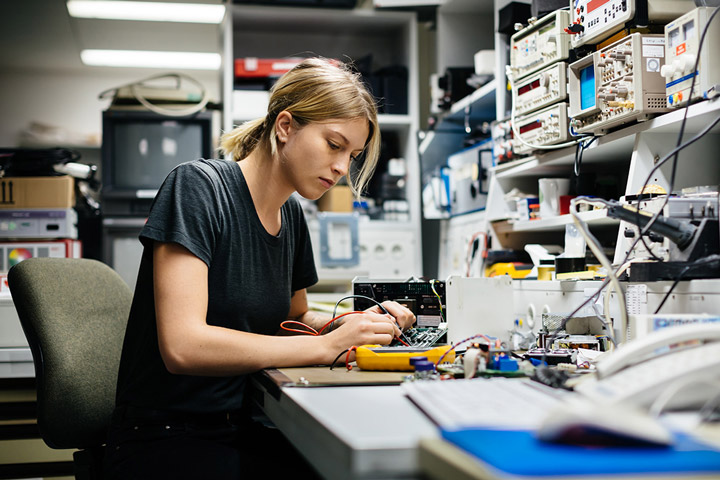- Go to homepage
- Course areas
- Electrotechnology
- Certificate II in Electronics

OverviewAbout this course
Explore ways to make machines move when using the right circuits. You'll be able to pursue your passions studying electronics with career pathways leading to many technologically advanced industries like medicine, aircraft, space travel, broadcasting and more.
OutcomesWhat you'll gain
Learning outcomes
Through a mixture of theory and practical course work, learn to:
Build and test basic electronic circuits
Conduct quality and functional tests on assembled electronic apparatus
Repair basic electronic apparatus faults through component replacement
Use computer applications relevant to the workplace
Course outcomes
Gain practical experience and develop specialist skills that give you an advantage in the job market.
A nationally accredited Certificate II qualification
The skills to construct a complex electronic control circuit
The ability to analyse voltages and currents using various test equipment
Strong pathways to continue your studies and enhance your career opportunities
SuitabilityIs this course right for you?
Entry requirements
Some courses require evidence of previous experience or study before you can enrol
- There are no entry requirements for this qualification. You can enrol today.
Completion requirements
During your study you’ll need to provide your teacher with the following evidence:
Entry recommendations
To be prepared for this course, we recommend that you have:
An analytical approach to problem-solving
Good fine motor skills and hand-eye coordination
The ability to follow instructions
An aptitude for technical work
Literacy and numeracy skills at a Year 10 level or equivalent level of education
TAFE NSW is committed to meeting the learning needs of every community. Meeting these needs can mean there are additional entry requirements at different campus locations. Check your preferred location for further requirements. If you need help preparing for study, contact us to find out how we can support you.
PathwaysFuture career and study options
Career pathways
Our graduates go onto roles like: electronics technician, broadcast engineer, mechatronics technician, radio technician, medical equipment maintenance, robotics technician and electronics assembly worker.
Study pathways
Take your study further with other courses offered at TAFE NSW:
Previous study0 Courses
Begin here to gain experience and confidence in this study area.
The Certificate II in Electronics does not have any pre-requisite courses.
Further study1 Course
Advance your skills to take your career to the next level
Related study0 Courses
Strengthen your expertise and gain specialist skills to expand your employability.
The Certificate II in Electronics does not have any related courses.
Your experience counts
At TAFE NSW, we recognise your previous study and work experience. You can apply for recognition of prior learning or a credit transfer with any of our courses. If you're successful you'll get your qualification faster.
UnitsUnits taught in this course
Courses are made up of a combination of both core and specialty units. In the Certificate II in Electronics qualification, you’ll need to successfully complete 360 weighting points, including 240 core and 120 speciality units.
Please note, not all specialty units are offered at every TAFE NSW location. It is highly recommended that you check with your preferred campus for information about the specialty units offered at that location.
Core units are central to the job outcomes of a particular industry or occupation. These are the units industry has agreed are essential to be capable and qualified at a particular study level.
Apply environmentally and sustainable procedures in the energy sectorUEERE0001
Document and apply measures to control WHS risks associated with electrotechnology workUEECD0016
Solve problems in direct current circuitsUEECD0043
Apply work health and safety regulations, codes and practices in the workplaceUEECD0007
TAFE NSW servicesFacilities and support
TAFE NSW provides support services across all campus locations and online. Whatever your needs or circumstances, we have the people, resources, counselling and facilities to support you in focusing on your studies.
TAFE NSW Disability Support Service
TAFE NSW Language, Literacy and Numeracy (LLN) support
TAFE NSW Aboriginal Support; Learner support (ABE)
TAFE NSW Careers, Counselling and Pathways Service
TAFE NSW Libraries
Scholarship programs – be supported as you explore your talents and fulfil your potential
Read&Write literacy and study support software is available free for all TAFE NSW students to use while studying on campus and at home
LinkedIn Learning – an online resource which offers innovative courses and tutorials to improve your personal and professional skills
Student associations – get social with our student community